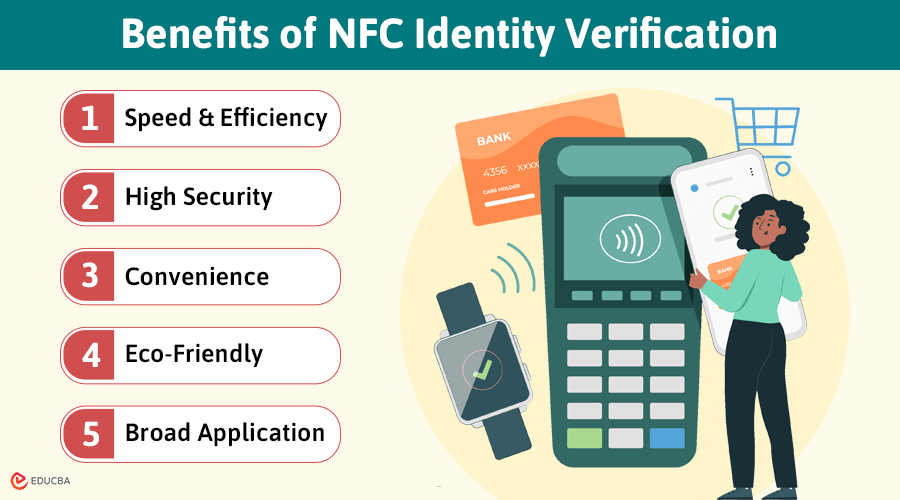
Introduction to NFC Technology
Security is a top priority, and technology constantly evolves to meet this need. One such advancement is NFC Identity Verification, a wireless technology gaining popularity for its ability to securely verify personal identity with a simple tap. Built on the principles of RFID verification, NFC allows devices to communicate over short distances, making it a fast and efficient method for identity authentication. Let us explore how NFC works and why it is becoming a go-to solution for secure identification.
What is NFC Identity Verification?
NFC Identity Verification uses Near Field Communication (NFC) technology, enabling devices to communicate wirelessly when they are only a few centimeters apart.
NFC enables secure identity verification by storing encrypted personal data in NFC-enabled devices, such as smartphones or smart cards. When you tap your device on an NFC reader, the embedded chip instantly transmits the data to verify your identity.
With its ease of use and high level of security, NFC Identity Verification is becoming an increasingly popular choice in sectors like banking, travel, and access control.
By adopting this technology, organizations can significantly enhance their verification processes without compromising user experience or safety. With NFC at the forefront of innovation, the future of secure identification looks promising.
How Does NFC Identity Verification Work?
The process of NFC Identity Verification is simple and efficient:
- Tap the Device: The user taps an NFC-enabled device (such as a smartphone or card) on an NFC reader.
- Data Exchange: The NFC-enabled device exchanges encrypted data with the reader. The data typically includes unique identifiers that only authorized parties can interpret.
- Verification: The system verifies the data against its database. If everything matches, the system authenticates the user.
- Access Granted: Once verified, the system grants access or authorization, often sending a real-time notification to the user confirming the successful verification.
Benefits of NFC Identity Verification
NFC Identity Verification offers several key benefits:
- Speed and Efficiency: The process is nearly instantaneous, saving time and enhancing user experience.
- High Security: The encrypted data transmission significantly reduces the risk of unauthorized access or fraud.
- Convenience: With NFC-enabled smartphones and wearables becoming more common, users no longer need separate cards or IDs.
- Eco-Friendly: NFC eliminates the need for paper-based identity verification, contributing to environmental sustainability.
- Broad Application: NFC is adaptable to various industries, including banking, healthcare, education, and more.
Common Applications of NFC Identity Verification
NFC Identity Verification is already transforming various industries:
- Mobile Payments: NFC technology allows customers to securely pay with just a tap of their phone at checkout.
- Access Control: Businesses use NFC to manage access to secure areas, where employees can unlock doors with their NFC-enabled ID cards or smartphones.
- Healthcare: Patients can verify their identities before receiving treatment, ensuring they receive the correct care without delays or mix-ups.
- Event Ticketing: Concerts and events now use NFC wristbands or tickets, which allow attendees to enter easily by tapping their wristbands against a reader.
- Education: NFC helps schools manage student identification, granting access to campus facilities and securing records.
Potential Concerns and Solutions
While NFC Identity Verification offers many advantages, there are some concerns to address:
1. Security Vulnerabilities
Although NFC is encrypted, there is always a risk of hacking. To minimize this risk, businesses should:
- Use strong encryption methods
- Conduct regular security audits and updates
2. Privacy Issues
Some users may be concerned about how their data is collected and used. To build trust, organizations must:
- Provide clear privacy policies
- Maintain transparency in data handling practices
3. Device Compatibility
Not all devices support NFC, which could limit access for some users. To enhance accessibility, businesses should:
- Ensure cross-platform compatibility
- Encourage the use of NFC-enabled devices
Final Thoughts
NFC Identity Verification is rapidly becoming a trusted and efficient method for securely verifying identity. By allowing users to confirm their identity with a simple tap, NFC provides a seamless experience without compromising security.
As this technology evolves, its use will grow across more industries, creating a future where secure transactions and identity management are simple and dependable. With the right security measures, organizations can make NFC Identity Verification a cornerstone of modern identity solutions.
Recommended Articles
We hope this article on NFC Identity Verification has been informative. For more insights into secure technology and its applications across various industries, check out these recommended articles.

